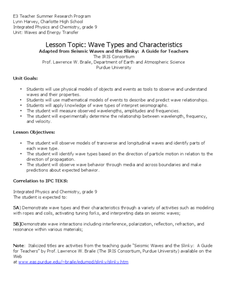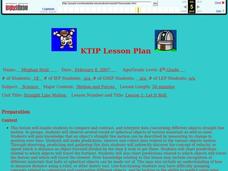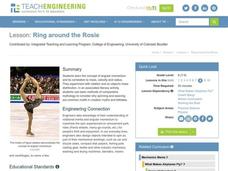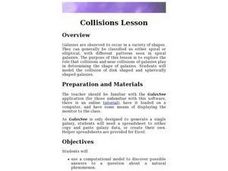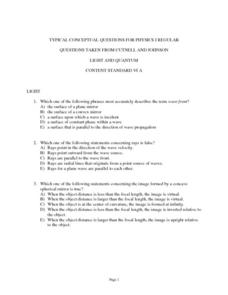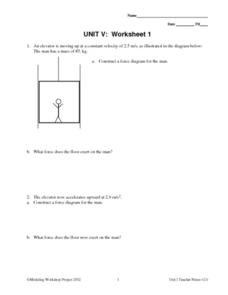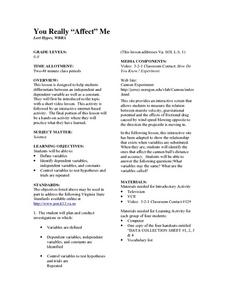Curated OER
Wave Types and Characteristics
Ninth graders identify the different parts of a wave. In this physics lesson, 9th graders observe wave behavior as it travels through a boundary. They determine the relationship between wavelength, frequency and velocity.
Curated OER
Numerical Determination of Drag Coefficients
Students create a video of an object falling with a drag. In this physics instructional activity, students calculate drag coefficient using data from Logger Pro. They calculate velocity and acceleration of the object.
Curated OER
Straight Line Motion
Fourth graders compare/contrast and interpret data concerning different objects straight line motion. They observe several round or spherical objects of various materials and sizes. Students make predictions, observe and collect data...
Curated OER
Ring Around the Rosie
Students work together to discover the concept of angular momentum. They participate in experiments in which they test rotation and relate it to an object's mass. They participate in a literacy activity in which they compare mythology...
Curated OER
Blowing in the Wind
Pupils identify and interpret maps, graphs, charts, tables and political cartoons. Students identify what a compass rose is and review its meaning in relation to standard directions. Pupils design their own weathervanes. Students pencil...
Curated OER
Collisions Lesson
Tenth graders explore the role that collisions and near collisions of galaxies play in determining the shape of galaxies. They model the collision of disk shaped and spherically shaped galaxies.
Curated OER
Interactive Physics
High schoolers explore projectile motion by modeling that motion using Interactive Physics simulation software. They study horizontal and vertical velocity and solve basic problems related to projectile motion.
Curated OER
The Bee Problem
In this algebra worksheet, 11th graders rewrite a word problem using algebraic symbols. They calculate the distance flown before the impact of the two objects occurs. An answer key is provided.
Curated OER
Worksheet 19: Ship Positions
In this math worksheet, learners read informational paragraphs and then answer 18 questions using data from their readings. Questions are about vectors, positions, distance and orbits.
Curated OER
Typical Conceptual Questions for Physics I - Light and Quantum
This is a stellar overview of everything light and quantum! There are 30 multiple choice questions, none of them requiring any mathematical computation. There are a few diagrams to analyze: light rays striking reflective and refractive...
Curated OER
Circular Motion
A helpful physics presentation will have you talking in circles! The material covers circular motion, and includes diagrams, formulas, and example problems. When used in addition with directed instruction and a teacher-created form of...
Teach Engineering
Energy on a Roller Coaster
Roll with your class into the idea of conservation of energy. Pupils use a roller coaster track to collect data to reinforce the concept of conservation of energy and the influence of friction. Class members then create a graph from...
Curated OER
Motion Problems
In this motion worksheet, students complete motion word problems where they explain and define issues having to do with motion. Students complete 32 problems.
Curated OER
Unit V: Worksheet 1 - Constant Force
In a force diagram, a stick figure man in an elevator takes a ride. Physics analysts work out the force exerted on him by the elevator floor. As the acceleration changes, they draw new force diagrams and compute new force values. This...
Teach Engineering
Exploring Energy: Kinetic and Potential
The potential of the energy in the class is moving. The third segment in a six-part unit on energy provides a deeper understanding of kinetic and potential energy. Learners understand the relationship between mass, speed, and energy and...
Cornell University
Catapults
Ready, aim, fire! Launch to a new level of understanding as scholars build and test their own catapults. Learners explore lever design and how adjusting the fulcrum changes the outcome.
Explore Learning
Quadratics: Polynomial Form
Throught this subscription-based sight, learners explore different aspects of the parabola by changing equations from standard to vertex form. Next, find the general form of the vextex based on the values of a, b, and c, and investigate...
New Mexico State University
Lab 6: Kepler's Laws
A 15-page package thoroughly teaches your physics or astronomy learners about Kepler's three laws of planetary motion. Each one is stated and explained. Class members answer questions, solve problems, and participate in the classic...
Bowels Physics
Direct and Inverse Relationships
Viewers learn to recognize direct and inverse relationships in the world of physics with a presentation that reveals how to recognize a direct versus an inverse relationship from a formula or graph. After showing basic examples, the...
Curated OER
You Really "Affect" Me
Middle schoolers examine the effects of variables. They view a video which introduces the concepts, take part in an internet-based activity, then engage in a hands-on activity which allows them to practice what they have been studying.
Curated OER
Worksheet 3: Graphing Speed and Time
In this graphing speed and time worksheet, learners answer 7 questions regarding graphing, speed, distance, derivatives, Newton's method and wheel radius.
Curated OER
Atoms, Molecules and Ions
Atomic theory, experiments that contributed to our knowledge of matter, atomic structure, isotopes, and ions are covered in these 33 slides. Quality diagrams and labeled charts will help activate understanding. The presentation concludes...
Teach Engineering
A Shot Under Pressure
You've got to pump it up! Using the equations for projectile motion and Bernoulli's Principle, class members calculate the water pressure in a water gun. The pupils collect data on the number of pumps and distance traveled in order to...
It's About Time
Impact Events and the Earth System
What would happen to Earth if an asteroid struck it? Assist young scientists as they explore the mechanics of an impact event and effects caused by it; calculate the energy released once an asteroid strikes Earth's surface; and compare...


